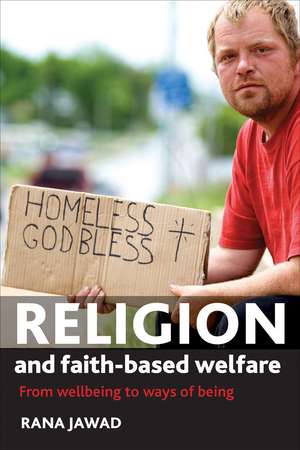Religion and Faith-based Welfare: From Wellbeing to Ways of Being
Autor Rana Jawaden Limba Engleză Hardback – 25 sep 2012
This original book makes a timely—and potentially controversial—contribution to social policy debates. Rana Jawad examines the workings of religious welfare organizations from the world’s major faiths, offering a critical overview of the role religious values, actors, and institutions have on social programs. Combining historical discussions of the relationship between religion and social policy in Britain with a comparative theoretical discussion that covers continental Europe and North America, she brings a host of perspectives together, arguing for an analytical shift in the definition of well-being through a concept she calls “ways of being,” which, she argues, better reflects the moral, ideological, and cultural underpinnings of social welfare.
Preț: 751.77 lei
Preț vechi: 916.79 lei
-18% Nou
Puncte Express: 1128
Preț estimativ în valută:
143.85€ • 150.57$ • 119.73£
143.85€ • 150.57$ • 119.73£
Carte disponibilă
Livrare economică 10-24 martie
Preluare comenzi: 021 569.72.76
Specificații
ISBN-13: 9781847423900
ISBN-10: 1847423906
Pagini: 268
Dimensiuni: 152 x 229 x 20 mm
Greutate: 0.54 kg
Ediția:New.
Editura: Bristol University Press
Colecția Policy Press
ISBN-10: 1847423906
Pagini: 268
Dimensiuni: 152 x 229 x 20 mm
Greutate: 0.54 kg
Ediția:New.
Editura: Bristol University Press
Colecția Policy Press
Notă biografică
Rana Jawad is a lecturer in social policy at the University of Bath and author of Religion and Social Welfare in the Middle East, also published by the Policy Press.
Cuprins
Acknowledgements
Introduction: Thinking about religious welfare and rethinking social policy
Part I: Religion, social welfare and social policy in the UK
1. Conceptualising the relationship between religion and social policy I: historical perspectives
2. Conceptualising the relationship between religion and social policy II: theoretical perspectives
3. The contemporary British context: social and policy profiles in relation to religion
Part II: Sector-specific religious welfare provision in the current UK context
4. Social work and social action
5. Health
6. Social care
7. Poverty reduction and financial assistance
8. Housing, urban governance and regeneration
Conclusion: Theoretical and practical implications for social policy
References
Index
Introduction: Thinking about religious welfare and rethinking social policy
Part I: Religion, social welfare and social policy in the UK
1. Conceptualising the relationship between religion and social policy I: historical perspectives
2. Conceptualising the relationship between religion and social policy II: theoretical perspectives
3. The contemporary British context: social and policy profiles in relation to religion
Part II: Sector-specific religious welfare provision in the current UK context
4. Social work and social action
5. Health
6. Social care
7. Poverty reduction and financial assistance
8. Housing, urban governance and regeneration
Conclusion: Theoretical and practical implications for social policy
References
Index
Recenzii
“The connections between religion and welfare are growing in importance almost by the day. Rana Jawad’s contribution to the debate is particularly welcome: it is historically informed, theoretically grounded, and abundantly illustrated. It will become required reading for academics and policymakers alike.”
“This book does so much more than the title suggests . . . In many ways, this is the book on religion and social policy that we have all been waiting for.”
“A compellingly intelligent and ambitious examination of welfare and faith communities in Britain forms the basis of this important text. Illuminated by a jaunty but penetrating literary style, Rana Jawad’s analysis excavates the rich, contextualising sediment of some of the nation’s immigrant communities and socio-historical welfare policies to reveal a powerful analysis of the crucial relationship between contemporary welfare policies and religious identities.”
“For too long social services and the welfare state in the UK have been discussed without reference to religion. In a single volume, Rana Jawad puts that right. She offers a comprehensive overview of religion’s vital role in the past and present of social welfare, and shows what an important contribution faith can still make to its theory and practice in the twenty-first century.”
